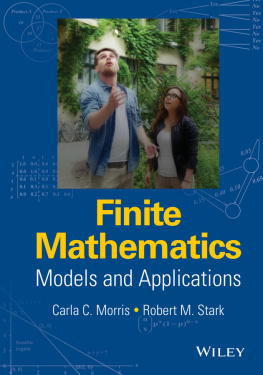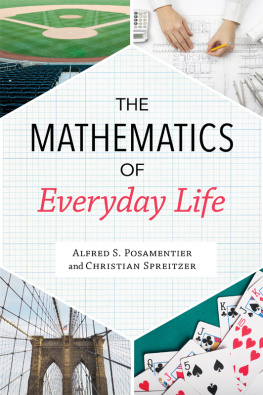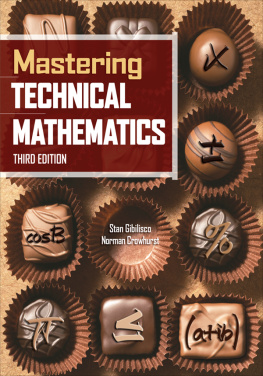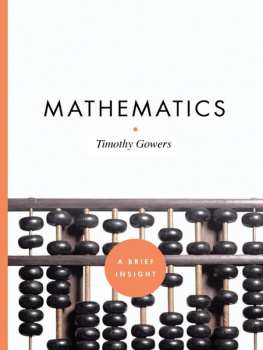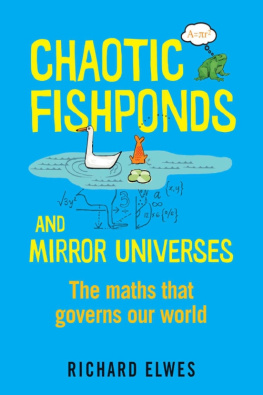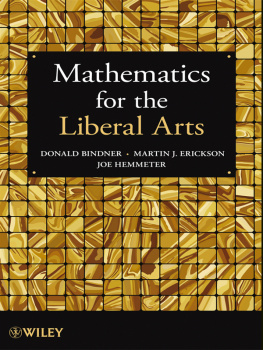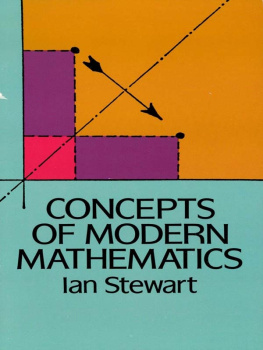Contents
Guide
Page List
50 VISIONS OF MATHEMATICS
Edited by
SAM PARC
Institute of Mathematics and its Applications



Great Clarendon Street, Oxford, OX2 6DP,
United Kingdom
Oxford University Press is a department of the University of Oxford.
It furthers the Universitys objective of excellence in research, scholarship,
and education by publishing worldwide. Oxford is a registered trade mark of
Oxford University Press in the UK and in certain other countries
Oxford University Press 2014
The moral rights of the authors have been asserted
First Edition published in 2014
Impression: 1
All rights reserved. No part of this publication may be reproduced, stored in a retrieval system, or transmitted, in any form or by any means, without the prior permission in writing of Oxford University Press, or as expressly permitted by law, by licence or under terms agreed with the appropriate reprographics rights organization. Enquiries concerning reproduction outside the scope of the above should be sent to the Rights Department, Oxford University Press, at the address above
You must not circulate this work in any other form
and you must impose this same condition on any acquirer
Published in the United States of America by Oxford University Press
198 Madison Avenue, New York, NY 10016, United States of America
British Library Cataloguing in Publication Data
Data available
Library of Congress Control Number: 2013948420
ISBN 9780198701811
Printed and bound by
CPI Group (UK) Ltd, Croydon, CR0 4YY
Links to third party websites are provided by Oxford in good faith and
for information only. Oxford disclaims any responsibility for the materials
contained in any third party website referenced in this work.
FOREWORD: A BAD MATHEMATICIANS APOLOGY
DARA O BRIAIN
Whenever an anthology of great mathematics is compiled, the foreword, the warm-up man, is the best position Ill get on the bill. And this is for good reason. I started on the same path as these people, who will be here in a page or two with their bright ideas and their elegant proofs. In fact, if multiverse theory is to be believed there may even be a region of spacetime in which I continued there, struggling to keep up. This is our reality, though, and in this one, they kept going with the equations and I ran off to the circus. I left a field where we compare the properties of one thing to another in the hope of furthering our knowledge of both, and joined a trade where we say things like Sex is a lot like a bank account
This should never be construed as maths loss for comedys (arguable) gain.
Studying the mathematical sciences requires not just a quick mind, but a dedicated one. An entire syllabus can often be series of linked statements rolling on logically from the very first. If you miss a lecture, perhaps because college was also where you discovered telling jokes to crowds, partying, and the sort of exotic women who werent in your secondary school, you can find yourself playing a year-long game of catch-up. You still attend the lectures but it becomes an exercise in the transcription of mathematics rather than the comprehension of it.
In the only facet of my life at the time which could have been described as monastic, I would sit at a desk in my lectures, scratching out my personal copy of the great theorems as the lecturer argued them out for me on the blackboard. Each lecture would cover about six A4 pages, furiously scribbled in the hope of being re-read at some later date when it might make sense in context. The high-water mark of this was a proof in second-year group theory for something called Sylows theorems. The details of what Sylow theorised neednt concern you now. What is important was that it took four one-hour lectures to explain/dictate what is essentially a single result, scribbled furiously over 27 sheets of A4 paper. I looked it up online a minute ago and could make no sense of it there either.
I recently downloaded an Oxford University course on quantum mechanics. 27 lectures, recorded live, covering the sort of topics I had only seen before through a blur of a newly discovered social life. Here was my chance to put right the mistakes of a younger man, sat in my home with a notepad and pen.
I pressed play on the first one, the lecturer began, and immediately I had to start writing frantically as the blackboard was filled with line after line of symbols. For Proust, nostalgia was triggered by the taste of madeleine cake; for me, it was scribbling maths furiously and trying to keep up with a sustained argument. Luckily, just when I could feel it slipping away from me, the cat walked across the keyboard, stood on the space bar, and the video stopped. I was suddenly back to being a 41-year-old man, sitting in his kitchen on the family computer, but almost out of breath from the writing.
By contrast, a friend sneaked me into a third-year philosophy lecture once. Pen at the ready, notepad open, I found myself attending what I could only describe as a chat. A man burbled amiably at the head of the class and the students nodded, deigning occasionally to jot the odd note down. The lecture was about the veil of perception, I recall, the theory that what we sense about the reality around us is only what is fed through our physical senses and since this veil exists between us and presumed, actual reality, we cannot come to any definite conclusions about the nature of that reality.
I might have that wrong. I almost definitely have some part of it incorrect. Id even welcome it being corrected by any passing philosophy professor. The point is, though, thats what I remember from a single lecture 19 years ago. I did four lectures about Sylows theorems, plus surrounding material and question sheets, and then an exam, which I presumably passed. And I still had to google it this evening to remind myself what it was about.
So, maths is intense. But you stick with that because it is so beautiful. And this beauty is often not clear to outsiders.
Youll often hear mathematicians talk about beauty. Usually it is in reference to an elegance or wit in the argument; an efficiency in paring a question down to its most important parts; how a few lines of simple logic reveal a deep truth about numbers, or shape, or symmetry.
There are other things that make maths beautiful, however, particularly in comparison to the other sciences. For a start, it is delightfully uncluttered with Latin names. Not for maths the waste of energy learning off genus, phylum, and kingdom of a snail that looks pretty much the same as the next snail, except for a slightly stripier shell. Or the proper name of that tube that connects the inner ear of a horse to that other part of the inner ear of the horse.
Equally, maths was never too bothered about measuring things. I spent four years doing maths and probably never saw a number, other than the one next to the question, or at the bottom of the page. Well do the variables and somebody with an oscilloscope can plug in the numbers. Maths will predict the results and somebody else can go off and build a 17-mile-long tunnel under Switzerland and tell us if were right. This is not just disdain; theres an admission of practical ineptitude implied too. There are 500,000 rivets in the Large Hadron Collider. If theyd left them to the mathematicians those packets of protons would have gone four feet before hitting a stray lump of solder. Or a cufflink. Or a mathematician soldered to the tube, by his cufflink.


